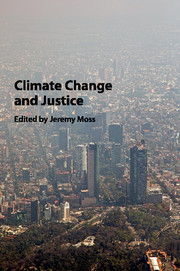Book contents
- Half title page
- Title page
- Copyright page
- Contents
- Contributors
- Book part
- Introduction: climate justice
- 1 Climate change and state consent
- 2 Geoengineering in a climate of uncertainty
- 3 Climate justice and territorial rights
- 4 Exporting harm
- 5 What’s wrong with trading emission rights?
- 6 A just distribution of climate burdens and benefits: a luck egalitarian view
- 7 Individual duties of climate justice under non-ideal conditions
- 8 Acts, omissions, emissions
- 9 Individual responsibility for carbon emissions: is there anything wrong with overdetermining harm?
- 10 Climate change: life and death
- 11 What we have done ≠ what they can do
- 12 Empathising with scepticism about climate change
- Bibliography
- Index
- References
Bibliography
Published online by Cambridge University Press: 05 November 2015
- Half title page
- Title page
- Copyright page
- Contents
- Contributors
- Book part
- Introduction: climate justice
- 1 Climate change and state consent
- 2 Geoengineering in a climate of uncertainty
- 3 Climate justice and territorial rights
- 4 Exporting harm
- 5 What’s wrong with trading emission rights?
- 6 A just distribution of climate burdens and benefits: a luck egalitarian view
- 7 Individual duties of climate justice under non-ideal conditions
- 8 Acts, omissions, emissions
- 9 Individual responsibility for carbon emissions: is there anything wrong with overdetermining harm?
- 10 Climate change: life and death
- 11 What we have done ≠ what they can do
- 12 Empathising with scepticism about climate change
- Bibliography
- Index
- References
- Type
- Chapter
- Information
- Climate Change and Justice , pp. 236 - 248Publisher: Cambridge University PressPrint publication year: 2015



